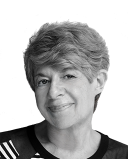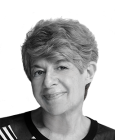Sport and Competition
Puzzle: A Film Finds the Missing Pieces in a Woman's Life
A director discloses how to shape a character.
Posted July 26, 2018
Marc Turtletaub is the director of the new film Puzzle, released by Sony Pictures Classics. The film is set in motion when Agnes (Kelly Macdonald), a wife and mother in her early 40s leading a very unassuming life, receives that most ordinary of birthday gifts, a jigsaw puzzle. Psychology Today recently had the opportunity to co-host a screening and panel discussion about the film's themes. I later spoke further with the director. What follows is part of that discussion.

What drew you to this story of a woman whose life seems so unremarkable?
It all begins with the written word, and in my years in the business, first as a producer and now as a director, it is rare that you receive a screenplay which is so beautiful and fully formed. This was developed elsewhere and sent to me by two friends who are producers, thinking that I might like to direct it. I was immediately taken with the writing and then the subject matter: It’s a story with a woman at the center; a woman over the age of 40—rare to find. And she is a woman who sort of comes of age at the age of 40. I can’t think of another movie similar to that in recent years. I felt like I needed to tell this story.
She’s not a woman of very many words. So, what particular features in the script, in the formation of the story, in the way it was drawn out, captured your interest?
She’s not a dull woman, she’s just an unsophisticated woman. And the reason that she doesn’t speak much in the beginning is that there’s no one there who can actually hear what she has to say, with the exception of her older son. We wanted her wit and her intelligence to come out, and the way Kelly and I talked about it was to have it leak out. It comes out in bits and pieces, as Agnes is with the church ladies and she talks about having to put your sins in little monthly packages. She’s speaking under her breath, but it comes out in front of other people. When she meets Robert (Irrfan Khan) and he says, “I work at home,” she immediately says, ‘Oh, I do too.” Of course, she’s talking about tending to her husband and two kids. Her wit comes out in little moments, until she finds her voice.
The protagonist is a woman in her 40s played by a woman in her 40s. Why are we even remarking on this? What is the industry thinking that gets us into the significant omission of such people?
I think it’s starting to change, but it has been a male-dominated industry not only in terms of the directors but the folks at the studios. The writers and even the editors have been predominantly male. And it’s a societal thing as well. It has been perfectly acceptable to see men over the age of 40 playing leading roles and rare to see women over the age of 40. When I got this screenplay, I felt, “What a great opportunity to tell this particular woman’s story.”
From within, does it feel like it’s changing?
It does for me. We’ve always been interested in telling stories, stories that inspire or illuminate or connect people, regardless of whose story it was, at the same time being aware that we needed to have a voice for women and for people of color. Those can range from something as simple as Little Miss Sunshine, in which the message was: Do what you love and don’t worry about the rest, to something that was societally historical, like Loving.
Agnes is certainly not an action hero. What are the challenges in building a film around a character of few words?
She does find her voice; it comes over time. She begins to speak the truth to her husband, she begins to speak the truth to her children. Whether that’s criticizing her younger, bratty son or encouraging her older, sensitive son. She does it in a way that she had never done before. And she speaks to her husband in a different way than she’s ever done before. The job is to parcel that over time so that we see who she really is over time. Having a magnificent actor like Kelly Macdonald play that roll made my job relatively easy.
What do you look for in an actor who’s got to carry a story that is really internal but which you have to turn into something visual?
With an actress like Kelly there’s so much that is conveyed with body language and facial gestures. That’s what people pick up on and what an audience really loves—to be able to interpret what they see visually instead of necessarily being told everything. It’s actually a boon to a filmmaker when you have fewer words, well chosen. You have performances that allow the audience to interpret and to connect the dots between the last bit of action and the next bit of action. Most of what we see in Hollywood are movies that tell you how you’re supposed to feel. They do it in words; they do it in noise; they do it in music. You’re inundated with the filmmaker’s idea or the studio’s idea of how you should be interpreting the movie instead of being free to interpret what’s going on.
That’s what’s needed—the assumption that audiences have a certain intelligence.
We’re making films for intelligent people, for people who are thoughtful. Most folks are very sophisticated when it comes to moviegoing: We’ve all seen so many movies. It’s easy to smell a device or contrivance a mile off. What I aimed to do in Puzzle was to subvert those expectations. The story keeps going in directions that no one anticipated. Just when you think it’s going to be a movie about jigsaw puzzle competition, the Rocky of jigsaws, it’s not at all. In fact, the puzzle competition barely exists in the movie. And when you think the relationship story is going to go in a particular way, it goes a very different way. And when you think that the characters are going to be stereotypes, like the husband, he turns out to be far more interesting than just a rough-hewn, unaware man.

What did you lay out as the agent of Agnes’ transformation?
First, there’s her destiny coming to meet her in the form of a gift that she gets—which is the most unlikely of things—but which awakens her passion. She follows that passion to places that she never could have imagined, and I think we’ve all experienced that, where we go for something that feels right on a visceral level and then, all of a sudden, new and wonderful things open up to us. Robert is also an agent of transformation for her. He becomes a catalyst for change in her, because he sees her, and we all need to be seen.
We all want to be seen as we could be, for the possibilities in us.
That's what happens with Agnes. She doesn't have the ability to self-reflect in the beginning. Once he's able to see her, then she begins reflecting on who she is and who she might be.
Was there any ever doubt what the ending would be?
There were several alternative endings in the writing of it, before I even received the screenplay. When I received the screenplay, there were two alternative endings. When I got into the movie, I had chosen one, which I thought I preferred. It felt authentic, like what this woman would do in the end. But we left it somewhat open and when we got to shooting that scene, the two actors who are the husband and wife in the story came to me and said, “I think we ought to shoot the alternative ending because it feels more earned.” They were right. We shot both endings, and in the editing room improved upon the alternative ending. What you see on the screen is, in my mind, just the right ending. In special screenings we’ve found that what people talk about most are the opening scene, where we get to know this character in a way that’s very startling, and the last minute of the movie, where she makes some choices that we don't quite anticipate. People like the ending.
It is definitely not anticipated. Romantics might have preferred a different ending, but perhaps it has the most romantic ending of all. Once you see it, it feels inevitable.
It does, and that's what you want in audiences. There’s an expression in the industry, “Give people what they want in a way they don’t expect it.”
That’s exactly what this does. Did you want the audience to come away with any specific thought or feeling?
I always want to leave people free. But is there something that people will take away from it? Yeah. I think people will take away that you have to take care of yourself before you can begin to have a healthy relationship.
You create films, but do films also create you? Do they in fact have an effect on your thinking or the conduct of your own life? I know that the articles I research and write can change the way I conduct my life.
Everything we do shapes us. Working on a film shapes you in a particular way because it's a social art. It forces you to work with others in a collaborative way; that shapes you because you're expressing your innermost feelings and thoughts. It helps to reveal or refine your sensibilities. Specific films have the ability to inspire, if they're great films; I think of Dead Poets Society.
Did this one have any particular effect on the way you see things?
Yes, in understanding my own life, understanding my mother in ways that I hadn’t reflected on as deeply as I might have. I saw in this character a lot of my mother. The film gave me an opportunity to look back on her and my relationship with her.




